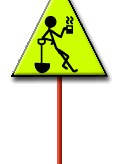
Myth #1 - IF YOU TOUCH A BABY BIRD (SQUIRREL, RABBIT, ETC.), THE MOTHER WILL REJECT IT.
This is a myth we were all raised on. It seems Adam and Eve taught this to their children and it's persisted ever since! We're not quite sure why wildlife got such a bum rap as poor parents, but this is definitely an old wives' tale. Wild animals make wonderful parents and aren't going to abandon their baby just because of an odd scent. We tell folks, what if your child was playing in the woods and got sprayed by a skunk? Would you call a social worker to take him away or dump him at the nearest bus station? Or would you put him in the tub and try to get the smell off? Of course you would scrub him up, warn him not to get so close to a skunk again, and continue to love and care for him! So, bottom line...if you've picked up a baby wild animal in an attempt to help her and we advise how to return her to mom, your scent won't make a bit of difference.
Myth #2 - I FOUND A BABY BIRD (SQUIRREL, ETC.) ON THE GROUND WITH NO SIGN OF A MOTHER, SO IT'S BEEN ABANDONED.
We get so many calls about "abandoned" babies. Once again, wildlife are getting a bum rap as parents. Wildlife moms (or dads, depending on the species) don't abandon their young. Now the baby may be orphaned, meaning the mom is deceased, but not abandoned. We have personally witnessed wildlife parents going up against predators far bigger and badder than they are as they try to protect their babies. If you find a baby wild animal without a mom in evidence, much depends on what species he is. The best advice is to IMMEDIATELY contact your area's best wildlife rehabilitator. He/she will ask you lots of questions, then tell you what to do about your particular situation.
Myth #3 - THE FIRST THING YOU SHOULD DO WHEN YOU FIND AN ORPHANED WILD BABY IS GIVE IT SOME WARM DILUTED MILK.
All of the wild babies we deal with require formula much richer than human babies so diluted milk would not come close to providing enough nutrition no matter what mammal you found. In addition, cow's milk is good for one creature and that would be a baby cow. To make matters even more complicated, milk produced for human consumption has things added that are not healthy for wild babies (there is much debate whether they're good for humans either, but that's another story for another day) and some of the ingredients are actually toxic for some wild species. So giving a wild baby milk, diluted or not, short term or not, is not a good idea. In addition, most of the time when a wild baby is found it is cold and dehydrated. Putting milk in a cold, dehydrated baby further complicates things. The dehydration and body temperature must be corrected before any food is introduced. So before you do anything, contact a wildlife rehabilitator. If there is a delay in speaking with one, slowly warm the animal and, if it's a mammal, you can administer rehydrating fluids (such as Pedialyte or Gatorade) as long as the animal can swallow. Do not give fluids to birds unless you are trained in how to do so or you could easily aspirate them.